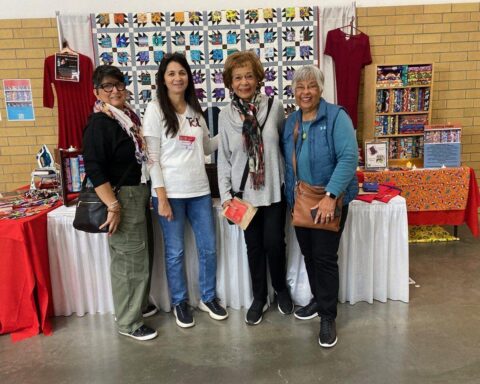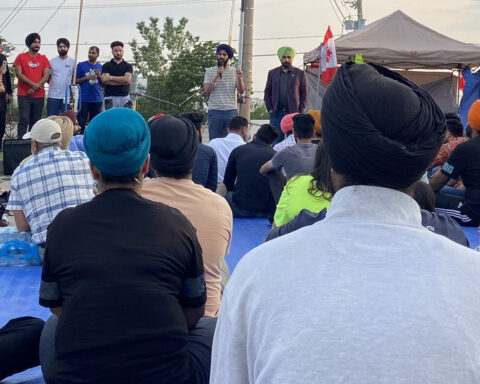On the eve of Canada’s 148th birthday, the Association for Canadian Studies released the findings of a survey titled: “Is Canada a Land of Equal Opportunity for All?” Three-quarters of the country’s population answered with a resounding yes. It’s the sort of response that’s in line with popular thinking that Canada is welcoming, inclusive and just. But emerging research suggests when it comes to immigration policy, Canada has a lot of work left to do.
Cultural Carriers
Devon Franklin, a graduate student in Ryerson University’s Immigration and Settlement program, is calling for a closer examination of recent policy reform to the sponsorship of parents and grandparents by immigrants to Canada.
In her paper, “The Parent and Grandparent Sponsorship Program Reforms: The Consequences of a Neoliberal Shift” Franklin calls out Canada on its narrow conception of what ‘economic contribution’ means. She asks, “Are we really comfortable with having a country that values people solely for economic contribution and solely for a cost-benefit model?”
Her work is in direct response to concerns raised by former Immigration Minister Jason Kenney in 2013 of, “the abuse of [the government’s] generosity in the parent and grandparent sponsorship program,” and the subsequently imposed regulations on the sponsor to have greater economic capacity.
The policy reform increased sponsors’ required minimum annual salary by 30 per cent. It also called for the sponsor to demonstrate an ability to take care of their parent or grandparent for 20 years as opposed to the previous 10.
While Franklin affirms she is not naïve to the fact that elderly parents or grandparents may be in need of health care or social assistance, this type of “cost-benefit” assessment of immigrants’ families undermines the cultural, social and indirect economic value they have.
For example, Franklin explains, parents and grandparents provide the needed childcare supports for the woman in an immigrant family to enter the workforce; they are also “cultural carriers” of tradition and heritage to children.
[P]arents and grandparents … are also “cultural carriers” of tradition and heritage to children.
“I think we need to adapt with the changing demographics of Canada,” Franklin tells New Canadian Media. “We’re supposed to be a multicultural country that embraces new cultures – we need to understand that there are cultures that want to live in an intergenerational household and that requires parents and grandparents being able to be sponsored over here.”
Indefinite detentions
This month, Renu Mandhane, executive director of the International Human Rights Program (IHRP) at the University of Toronto Faculty of Law, will meet with the United Nations Human Rights Committee in Geneva, Switzerland.
The topic at hand: Canada’s compliance with the International Covenant of Civil and Political Rights and specifically how a recent study by IHRP, “We Have No Rights”: Arbitrary imprisonment and cruel treatment of migrants with mental health issues in Canada, points to a disturbing trend in Canada’s detainment of migrants.
The purpose of the meeting is to encourage the UN to place pressure on the Canadian government to begin work on recommendations put forth in the IHRP’s damning 129-page report that takes an in-depth look at the stories of migrant detainees, specifically those suffering from mental health issues.
For example, the report indicates that of the over 7,300 migrants held in detention in 2013, 30 per cent were sent to maximum security provincial jails versus one of the three immigration holding centres stationed in Toronto, Montreal or Vancouver.
Furthermore, Mandhane shares with New Canadian Media that the IHRP found that people without immigration status, suffering from mental health issues, seemed to be routinely detained in provincial jails. While the government maintains this is because more treatment options are available in these facilities, Mandhane says her department’s research found otherwise.
“What this points to from a legal perspective is the fact that the decision of where you actually are held once you’re detained by Canada Border Services Agency (CBSA) is entirely discretionary – so there’s no laws or policies that really highlight when someone should be held in a maximum security jail versus in a holding centre.”
The report examines in detail everything from the anxiety, depression and Post-Traumatic Stress Disorder (PTSD) that can be caused by the fact that, unlike criminal detention, there are no known end dates for immigration detainees. At one provincial jail in Lindsay, Ont. a doctor only appears by video. Detainees said they were treated like, “garbage,” “animals”, or “something less than human.”
Particularly troubling for Mandhane is the lengthy periods of time some detainees were held for – some for two or three years, others for as long as 11 years.
“It was very surprising to me that there were people basically being warehoused in jails without any criminal charges for extremely lengthy periods of time,” she says.
Particularly troubling for Mandhane is the lengthy periods of time some detainees were held for – some for two or three years, others for as long as 11 years.
While Mandhane says there have been little in-roads made to date with the Minister of Public Safety Stephen Blaney’s office – the IHRP met with his office prior to releasing the study offering an opportunity to respond, but nothing came of it. The study has been gaining some attention in the mainstream media, particularly in the days following the death of Abdurahman Hassan, a migrant who died while being detained in the Lindsay, Ont. jail by CBSA. His family said the findings of this report mirror his experience in detention.
What the IHRP is calling for is an external review body for the CBSA to ensure accountability, transparency and the end to arbitrary decision-making in the detainment of immigrants where gaps in policy exist. It would also like to see a complete abandonment of the use of provincial jails in immigration detention, and the use of holding centres only when an individual “cannot be managed in the community,” Mandhane explains.
“We need to use more community alternatives to detention so people could be released on reporting conditions or a bond or surety, or if they are determined a flight risk, with electronic monitoring.”
For Mandhane, the report strikes a personal chord as her parents immigrated to Canada from India and most of her students and colleagues have an “immigration story.”
“[Canada] sort of [has] this identity as being a place people can seek refuge or a better life or opportunities and I just think the way we are treating non-citizens really needs to be assessed,” she says. “It kind of shows a bit of a disconnect between what we say we are and what we’re actually doing.”





